The History Book Club discussion

This topic is about
House of Stone
MIDDLE EAST
>
HOUSE OF STONE - GLOSSARY - (SPOILER THREAD)
date newest »
newest »
 newest »
newest »
 Lebanese Emigration and the Diaspora
Lebanese Emigration and the DiasporaThe Lebanese diaspora, while historically trade-related, has more recently been linked to the Lebanese Civil War, with many Lebanese emigrating to Western countries. Because of the economic opportunities, many Lebanese have also worked in the Arab World, most notably the Gulf countries like Saudi Arabia, the United Arab Emirates and Kuwait amongst others. Currently around 52% of Lebanon are Muslim and around 41% are Christian. The Lebanese diaspora identifies large numbers of both Muslims and Christian. Recent investigations shows that should the diaspora return to the Lebanon, it would be the only majority Christian country in the middle east, as the diaspora population is over 70% Christian, although significant Christian communities are found in Egypt (20-25%), Kuwait (15-20%), Qatar (15%), Syria (13%), UAE (10%), Jordan (10%) and Saudi Arabia (5%).
The Americas have long been a destination for Lebanese migration, with Lebanese arriving in some countries at least as early as the nineteenth century. The largest concentration of Lebanese outside the Middle East is in Brazil, which has reportedly over 7 million Brazilians of Lebanese ancestry, making Brazil's population of Lebanese nearly twice that of the entire population of Lebanon. There are also large Lebanese communities in Argentina, Chile, Colombia, Venezuela and the Caribbean. Many Lebanese have also been settled for quite some time in the United States, Canada, Australia and Europe, most notably France. There are also sizable populations in West Africa, particularly Ghana, the Ivory Coast, Senegal and Liberia.
Lebanese abroad are not presently permitted the right to vote in Lebanese elections. A law passed in late 2008 gives expatriates the right to vote in elections in 2013.
 Libby wrote: "Jill wrote: "Lebanese Emigration and the Diaspora...
Libby wrote: "Jill wrote: "Lebanese Emigration and the Diaspora...Interesting information, Jill, I had no idea how strong their numbers were outside of Lebanon; I am curious as to why the law was changed to al..."
So far there has been no mention of the expatriate voting situation.
I was surprised at the number of Lebanese that went to Brazil and South America in general.
 DonnaR wrote: "A link to a good article that discusses a little about Shadid's personal life and his attraction to the house. It states that his second wife, Nada, lives there now with their son. There's also a..."
DonnaR wrote: "A link to a good article that discusses a little about Shadid's personal life and his attraction to the house. It states that his second wife, Nada, lives there now with their son. There's also a..."Thanks for that link, DonnaR
 DonnaR wrote: "A link to a good article that discusses a little about Shadid's personal life and his attraction to the house. It states that his second wife, Nada, lives there now with their son. There's also a..."
DonnaR wrote: "A link to a good article that discusses a little about Shadid's personal life and his attraction to the house. It states that his second wife, Nada, lives there now with their son. There's also a..."This is awesome! Thanks for the link.
 The Oud
The OudDr. Khairalla crafts his own stringed instrument, his favorite being the oud.
The Oud is a pear-shaped stringed instrument commonly used in Arabic, Hebrew/Jewish, Greek, Turkish, Byzantine, North African (Chaabi, Classical, and Andalusian), Somali and Middle Eastern music. Construction of the oud is similar to that of the lute. The modern oud and the European lute both descend from a common ancestor via diverging paths. The oud is readily distinguished by its lack of frets and smaller neck. It is considered an ancestor of the guitar.
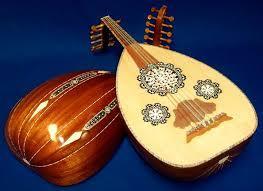
message 60:
by
Bentley, Group Founder, Leader, Chief
(last edited May 10, 2013 05:26PM)
(new)
-
rated it 4 stars
 The Bouzouki
The Bouzouki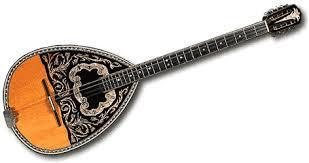
This is the other stringed instrument that is essential to Middle Eastern music.
The bouzouki is a Greek musical instrument that was brought to Greece in the 1900s by immigrants from Asia Minor, and quickly became the central instrument to the rebetika genre and its music branches. A mainstay of modern Greek music, the front of the body is flat and is usually heavily inlaid with mother-of-pearl. The instrument is played with a plectrum and has a sharp metallic sound, reminiscent of a mandolin but pitched lower. There are two main types of bouzouki. The trichordo (three-course) has three pairs of strings (known as courses), and the tetrachordo (four-course) has four pairs of strings.
The name "bouzouki" comes from the Turkish word "bozuk," meaning "broken" or "modified", and comes from a particular re-entrant tuning called "bozuk düzen", which was commonly used on its Turkish counterpart, the "saz-bozuk". It is in the same instrumental family as the mandolin and the lute. Originally the body was carved from a solid block of wood, similar to the saz, but upon its arrival in Greece in the early 1910s it was modified by the addition of a staved back borrowed from the Neapolitan mandola, and the top angled in the manner of a Neapolitan mandolins so as to increase the strength of the body to withstand thicker steel strings. The type of the instrument used in Rembetika music was a three-stringed instrument, but in the 1950s a four-string variety was introduced.
(Source: http://en.wikipedia.org/wiki/Bouzouki)
More:
http://www.britannica.com/EBchecked/t...
http://www.greeksongs-greekmusic.com/...
 by GRAHAM MCDONALD (no photo)
by GRAHAM MCDONALD (no photo) by A.J. Racy (no photo)
by A.J. Racy (no photo) by V. Danielson (no photo)
by V. Danielson (no photo)
Jill- at the top title - only one line then image.
Also place on the Syria thread. Thanks. If you can add More: and some other links and a couple of books that would be best.
Also place on the Syria thread. Thanks. If you can add More: and some other links and a couple of books that would be best.
 Syria
Syria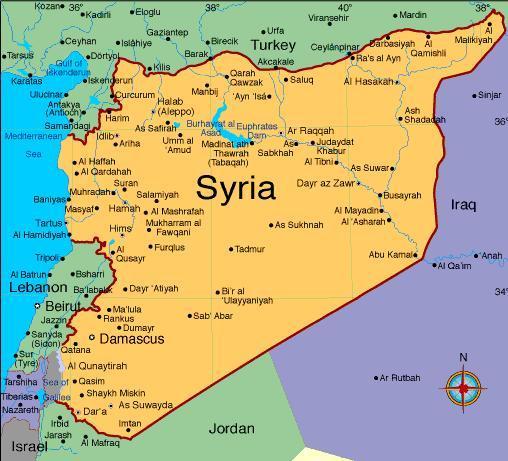
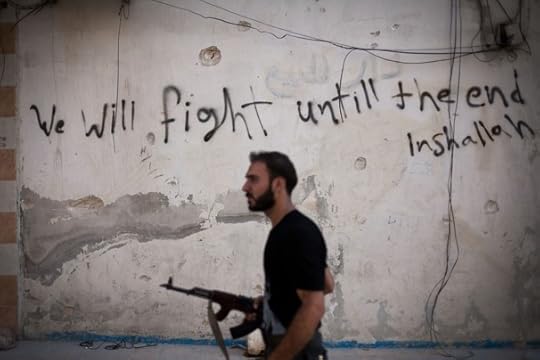
Syria,officially the Syrian Arab Republic, is a country in Western Asia, bordering Lebanon and the Mediterranean Sea to the West, Turkey to the north, Iraq to the east, Jordan to the south and Israel to the southwest. A country of fertile plains, high mountains and deserts, it is home to diverse ethnic and religious groups, including Kurds, Armenians, Assyrians, Turks, Christians, Druze, Alawite Shias and Arab Sunnis. The latter make up the majority of the population.
In English, the name "Syria" was formerly synonymous with the Levant (known in Arabic as al-Sham) while the modern state encompasses the sites of several ancient kingdoms and empires, including the Eblan civilization of the third millennium BC. In the Islamic era, its capital city, Damascus, the oldest continuously inhabited city in the world, was the seat of the Umayyad Caliphate, and a provincial capital of the Mamluk Sultanate of Egypt.
The modern Syrian state was established after the First World War as a French mandate, and represented the largest Arab state to emerge from the formerly Ottoman-ruled Arab Levant. It gained independence in April 1946, as a parliamentary republic. The post-independence period was tumultuous, and a large number of military coups and coup attempts shook the country in the period 1949–1971. Between 1958 and 1961, Syria entered a brief union with Egypt, which was terminated by a military coup. Syria was under Emergency Law from 1963 to 2011, effectively suspending most constitutional protections for citizens, and its system of government is considered to be non-democratic. Bashar al-Assad has been president since 2000 and was preceded by his father Hafez al-Assad, who was in office from 1971.
Syria is a member of one International organization other than the United Nations, the Non-Aligned Movement; it is currently suspended from the Arab League,] the Organisation of Islamic Cooperation, and self suspended from the Union for the Mediterranean.
Since March 2011, Syria has been embroiled in civil war in the wake of uprisings (considered an extension of the Arab Spring, the mass movement of revolutions and protests in the Arab world) against Assad and the neo-Ba'athist government and, as a result of the Syrian civil war, the government gradually lost control over most of Syria to the Rebel groups of the Free Syrian Army and other groups including Al-Nusra Front, an alternative government that was formed by the opposition umbrella group, the Syrian National Coalition, in March 2012. Representatives of this government were subsequently invited to take up Syria's seat at the Arab League. The opposition coalition has been recognised as the "sole representative of the Syrian people" by several nations including the United States, United Kingdom and France.
(Source: http://en.wikipedia.org/wiki/Syria)
More:
http://www.huffingtonpost.com/news/al...
https://www.google.com/search?q=syria...
http://www.factrover.com/people/Syria...
http://www.counterpunch.org/2013/05/1...
http://www.nationsencyclopedia.com/As...
http://www.countryreports.org/country
http://www.usnews.com/opinion/blogs/w...
 by Andrew Tabler (no photo)
by Andrew Tabler (no photo) by Lisa Wedeen (no photo)
by Lisa Wedeen (no photo) by Wieland Carsten (no photo)
by Wieland Carsten (no photo) by Barry Rubin (no photo)
by Barry Rubin (no photo) by Nikolaos van Dam (no photo)
by Nikolaos van Dam (no photo) by Judith E. Tucker (no photo)
by Judith E. Tucker (no photo) by Fred H. Lawson (no photo)
by Fred H. Lawson (no photo)
 Wonderful postings, Jill, thank you. I am having a hard time sticking with the book, but your postings have more than made up for it. I've learned more reading this today than I knew about Lebanon or Syria in the last decade. Crash course! :)
Wonderful postings, Jill, thank you. I am having a hard time sticking with the book, but your postings have more than made up for it. I've learned more reading this today than I knew about Lebanon or Syria in the last decade. Crash course! :)
 Jill wrote: "
Jill wrote: "My Syrian friend's aunt used to make labneh for me all the time. It is the same as that made in Lebanon and it is delicious.
Lebanese Yogurt
Yogurt, strained or not, is an important element i..."
We regularly eat labneh in pita bread/falafel sandwiches, with tomatoes and lettuce and cucumbers. Absolutely delicious.
 Janice....thanks for the kind words. The Glossary sometimes gives us a better idea of certain written words......the images of the olive trees comes to mind. They are so important to Lebanon but I had never seen one until I found it for the glossary.
Janice....thanks for the kind words. The Glossary sometimes gives us a better idea of certain written words......the images of the olive trees comes to mind. They are so important to Lebanon but I had never seen one until I found it for the glossary.You have made me hungry......I love labneh with pita bread (we call it Syrian bread)....it is yummy!!!
 Rafik Hariri
Rafik Hariri 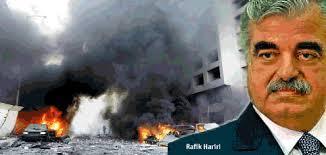
As prime minister of Lebanon, he is widely credited with getting the country back on its feet after the devastating 15-year civil conflict.
He held office from 1992 to 1998 and again from 2000 until his resignation in 2004 - a total of five terms. But on 14 February 2005, a year after he quit as leader, explosives were detonated as his motorcade drove past the St George Hotel in the Lebanese capital, Beirut.
His death had profound implications in Lebanon, paving the way for the Cedar Revolution and the withdrawal of Syrian troops from the country after 29 years.The investigation into his murder has meanwhile led to years of political turmoil.
Hariri was born in 1944 to a poor Sunni Muslim family in the southern port of Sidon. After training as a teacher, he went abroad to seek his fortune, following a path well-trodden by many of his countrymen. He found employment in a construction firm in Saudi Arabia, eventually establishing his own firm, Saudi Oger.
He became the personal contractor for Prince Fahd, who went on to become king of Saudi Arabia, and amassed a fortune that propelled him into the US magazine Forbes as one of the richest 100 men in the world. A flamboyant figure, he was well regarded among international leaders, counting French President Jacques Chirac as a close friend.
When he returned from Saudi Arabia in 1992 as prime minister, he was seen as a breath of fresh air in a country dominated by former militia leaders. Ordinary people pinned hopes on the dynamic tycoon to restore Beirut's pre-war reputation as a leading financial centre.
He put the country back on the international financial map through the issuing of Eurobonds and won plaudits from the World Bank for his plan to borrow and beg for reconstruction money.
Feud with Lahoud
But his economic record was mixed: his ambitious borrow-and-build schemes left massive public debt and budget deficit, which pushed up interest rates and slowed growth. He was accused of ignoring the poor, despite his long record of funding charitable causes. Ordinary Lebanese began to judge him by the same standards of cynicism applied to other politicians, many of whom had made their fortunes in civil war activities.
When he left power in 1998, it came about partly because Hariri was reluctant to play second fiddle to President Emile Lahoud, a former army chief.
Hariri's legacy was further tainted by accusations of corruption and he also faced criticism for saddling the country with big debts. But Hariri returned in October 2000, taking his old job back off the political veteran Selim al-Hoss. But he again fell out with his pro-Syrian government colleagues during the crisis over the extension of President Lahoud's term in office.
He never overtly came out against Syria in the dispute, but his resignation in October 2004 was taken as a clear protest against the Syrian pressure to keep Mr Lahoud in office.
It was a move which some say cost him his life.
(Source: http://www.bbc.co.uk/news/world-middl...)
More:
http://topics.nytimes.com/top/referen...
http://www.cbc.ca/news/world/story/20...
http://www.rhariri.com/
 by
by
 Nicholas Blanford
Nicholas Blanford by
by
 Robert Fisk
Robert Fisk by
by
 Fawwaz Traboulsi
Fawwaz Traboulsi by William E. Shapiro (no photo)
by William E. Shapiro (no photo) by Michael Kerr (no photo)
by Michael Kerr (no photo)
 Tammam Salam: Current Prime Minister of Lebanon
Tammam Salam: Current Prime Minister of Lebanon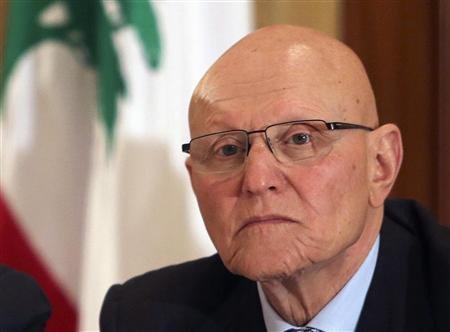
Tammam Salam, scion of a prominent political family, was officially named the new prime minister of Lebanon on Saturday after receiving a string of endorsements from the country’s warring factions over the past few days.
Mr. Salam, 68, was named to the post by the Lebanese president after he garnered 124 of the 128 votes in Parliament. A Sunni whose father, Saeb Salam, served six times as prime minister between 1952 and 1973, Mr. Salam will head a new government that many hope will overcome a dangerous political stalemate that last month led to the resignation of his predecessor.
Lebanon’s government is based on a delicate sectarian system, in place since the end of the civil war in 1990, that is meant to balance power among the country’s multiple sects. The formula requires that the president be a Maronite Christian, the prime minister a Sunni Muslim and the Parliament speaker a Shiite Muslim.
Eager to present himself as an independent, Mr. Salam emphasized at a news conference on Saturday that he would not bow to pressure from any group and intended to establish a national unity government made up of technocrats.
Mr. Salam appeared optimistic, saying, “The consensus around my nomination is the biggest proof of the intention of political forces to save the country.”
A political impasse last month led to the resignation of Prime Minister Najib Mikati, leaving a power vacuum in a country already in a state of heightened tension over the war in neighboring Syria, which has spilled into northern Lebanon and has left the country struggling to absorb a wave of refugees.
The Syrian conflict also plays into Lebanon’s sectarian divide. The Lebanese Shiite Muslim party Hezbollah supports the government of President Bashar al-Assad of Syria, while Sunni rivals back the Sunni-led Syrian insurgency.
Mr. Mikati announced his resignation on March 22, after Parliament failed to agree on rules to govern parliamentary elections set for later this year. Advisers said at the time that his resignation was also meant to protest the cabinet’s refusal to extend the tenure of the national police chief, viewed by many Sunnis as their only remaining protector in the country’s deeply politicized security forces.
Hezbollah’s adversaries blamed it for Mr. Mikati’s departure and accused it of behind-the-scenes diplomatic maneuvering. Rumors abounded that, fearing the imminent fall of the Syrian government, Hezbollah was rushing to install its own supporters in the Lebanese government to strengthen its control.
But in a surprisingly conciliatory move, the Hezbollah-led March 8 coalition threw its weight behind Mr. Salam, a man often described by Syrian activists as sympathetic to the Syrian uprising.
Having managed to secure endorsement from both the anti-Assad and the pro-Assad factions across the political spectrum, Mr. Salam now faces the overwhelming task of forming a cabinet in a fractious political environment where rival political blocs consistently fail to agree on contentious issues.
Mr. Salam’s family is one of Lebanon’s most influential. His grandfather was a deputy in the Ottoman Parliament and a nationalist figure during the French colonial mandate, and his father, a prime minister known as a staunch Arab nationalist, is remembered for saying, “One Lebanon, not two.”
The younger Mr. Salam is himself a seasoned politician, known for having taken a stand against Syrian meddling in Lebanese affairs, most notably when he abstained from running in the 1992 parliamentary elections to protest Syrian hegemony. He ran again in 1996 and won. Following the withdrawal of the Syrian Army from Lebanon in 2005, Mr. Salam served as minister of culture in the government of Prime Minister Fouad Siniora and successfully ran in parliamentary elections in 2009 as a candidate of the Future movement.
In 1982, Mr. Salam served as president of Al Makassed, a philanthropic Islamic association in Beirut, inheriting the position previously held by his father and, before that, his grandfather.
(Source: http://www.nytimes.com/2013/04/07/wor...)
More:
http://www.al-monitor.com/pulse/origi...
http://english.alarabiya.net/en/views...
http://en.wikipedia.org/wiki/Tammam_S...
http://articles.latimes.com/2013/apr/...
http://www.bbc.co.uk/news/world-middl...
 by
by
 Robert Fisk
Robert Fisk by Kamal Salibi (no photo)
by Kamal Salibi (no photo) by
by
 Fawwaz Traboulsi
Fawwaz Traboulsi by Sandra Mackey (no photo)
by Sandra Mackey (no photo) by Bernard Rougier (no photo)
by Bernard Rougier (no photo)
message 69:
by
Bentley, Group Founder, Leader, Chief
(last edited May 25, 2013 02:57PM)
(new)
-
rated it 4 stars
This does not bode well for Syria or Lebanon:
Bad News for Syria and poor Lebanon:
Hezbollah chief commits to victory in Syria
By BASSEM MROUE | Associated Press
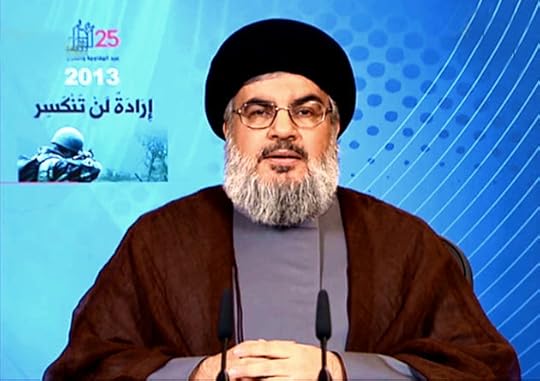
BEIRUT (AP) — The leader of Lebanon's Hezbollah militant group vowed to help propel President Bashar Assad to victory in Syria's bloody civil war, warning that the fall of the Damascus regime would give rise to extremists and plunge the Middle East into a "dark period."
In a televised address, Sheikh Hassan Nasrallah also said Hezbollah members are fighting in Syria against Islamic radicals who pose a danger to Lebanon, and pledged that his group will not allow Syrian militants to control areas along the Lebanese border. He pledged that Hezbollah will turn the tide of the conflict in Assad's favor, and stay as long as necessary to do so.
"We will continue this road until the end, we will take the responsibility and we will make all the sacrifices," he said. "We will be victorious."
The Hezbollah leader's comments offered the clearest public confirmation yet that the Iranian-backed group is directly involved in Syria's war. They also were Nasrallah's first remarks since Hezbollah fighters have pushed to the front lines of the battle for the strategic Syrian town of Qusair near the Lebanese frontier.
The fighting in Qusair, which government troops backed by Hezbollah pounded with artillery on Saturday, has laid bare the Lebanese Shiite group's growing role in the Syrian conflict. Hezbollah initially tried to play down its involvement, but could no longer do so after dozens of its fighters were killed in the town and buried in large funerals in Lebanon.
Remainder of article:
http://news.yahoo.com/hezbollah-chief...
Bad News for Syria and poor Lebanon:
Hezbollah chief commits to victory in Syria
By BASSEM MROUE | Associated Press

BEIRUT (AP) — The leader of Lebanon's Hezbollah militant group vowed to help propel President Bashar Assad to victory in Syria's bloody civil war, warning that the fall of the Damascus regime would give rise to extremists and plunge the Middle East into a "dark period."
In a televised address, Sheikh Hassan Nasrallah also said Hezbollah members are fighting in Syria against Islamic radicals who pose a danger to Lebanon, and pledged that his group will not allow Syrian militants to control areas along the Lebanese border. He pledged that Hezbollah will turn the tide of the conflict in Assad's favor, and stay as long as necessary to do so.
"We will continue this road until the end, we will take the responsibility and we will make all the sacrifices," he said. "We will be victorious."
The Hezbollah leader's comments offered the clearest public confirmation yet that the Iranian-backed group is directly involved in Syria's war. They also were Nasrallah's first remarks since Hezbollah fighters have pushed to the front lines of the battle for the strategic Syrian town of Qusair near the Lebanese frontier.
The fighting in Qusair, which government troops backed by Hezbollah pounded with artillery on Saturday, has laid bare the Lebanese Shiite group's growing role in the Syrian conflict. Hezbollah initially tried to play down its involvement, but could no longer do so after dozens of its fighters were killed in the town and buried in large funerals in Lebanon.
Remainder of article:
http://news.yahoo.com/hezbollah-chief...
 Bentley wrote: "This does not bode well for Syria or Lebanon:
Bentley wrote: "This does not bode well for Syria or Lebanon:Bad News for Syria and poor Lebanon:
Hezbollah chief commits to victory in Syria
By BASSEM MROUE | Associated Press
BEIRUT (AP) — The leader of ..."
If Russia and the U.S. can't come to a negotiated settlement over Syria, things are going to get really messy again in the Middle East.
 Lebanon is surrounded by warring factions, both inside and outside of their government and borders. As Hezbollah gains strength in Lebanon, as it does throughout the Middle East, trouble is going to escalate rapidly.
Lebanon is surrounded by warring factions, both inside and outside of their government and borders. As Hezbollah gains strength in Lebanon, as it does throughout the Middle East, trouble is going to escalate rapidly.
message 73:
by
Bentley, Group Founder, Leader, Chief
(last edited May 26, 2013 12:06PM)
(new)
-
rated it 4 stars
For sure Jill. In the past, wars were fought between countries and there were some standards in place for conventional warfare (not that it was always followed) but most of the time it was.
Nowadays with these splinter groups only existing because of funding from some country or countries which make them possible and who hide behind the funding and pretend otherwise - these groups are heinous and are an anathema to any sort of agreements, etc or standards or morality. In fact, members of these groups love the anger, unrest and destruction that they cause and they all pretend it is for a good cause and is in Allah's name which it is not. Just a way to kill innocent people and make everybody's life a nightmare including most of all - their own and the people they are in contact with. Iran has caused hornet's nests in this region and anybody against Israel, the United States, Britain and any allies of the Western world are their immediate new best buddies.
Sad.
Nowadays with these splinter groups only existing because of funding from some country or countries which make them possible and who hide behind the funding and pretend otherwise - these groups are heinous and are an anathema to any sort of agreements, etc or standards or morality. In fact, members of these groups love the anger, unrest and destruction that they cause and they all pretend it is for a good cause and is in Allah's name which it is not. Just a way to kill innocent people and make everybody's life a nightmare including most of all - their own and the people they are in contact with. Iran has caused hornet's nests in this region and anybody against Israel, the United States, Britain and any allies of the Western world are their immediate new best buddies.
Sad.
 Think about this........how many wars have been fought in the name of whatever God a people worship. In some cases, there may be some justification.....in most it is used as an excuse. That is what makes the unrest in the Middle East so frightening......and what draws the Muslims of Lebanon into the danger zone. With Hezbollah preaching hate in the name of Allah, it would be a Catch-22 situation for those people. It is a propaganda technique that is the most effective and has been used for centuries by all religions.
Think about this........how many wars have been fought in the name of whatever God a people worship. In some cases, there may be some justification.....in most it is used as an excuse. That is what makes the unrest in the Middle East so frightening......and what draws the Muslims of Lebanon into the danger zone. With Hezbollah preaching hate in the name of Allah, it would be a Catch-22 situation for those people. It is a propaganda technique that is the most effective and has been used for centuries by all religions.
The Crusades come to mind of course. And that is why theocracies make no sense - they cannot separate religion from their government and therein lies the danger. I do not think that most Lebanese want to be drawn into any conflict whatsoever and Hezbollah is once again hijacking a country.
Here is another recent news article from the New York Times:
U.S. Fears the Fighting in Syria Might Spill Over Into Lebanon, Kerry Says
AMMAN, Jordan — Secretary of State John Kerry said Wednesday that the United States was increasingly concerned that the escalating fighting in Syria might slip across the border with Lebanon and destabilize that country.

Secretary of State John Kerry met with King Abdullah II of Jordan in Amman on Wednesday. Mr. Kerry said Lebanon was “at risk” of being swept up in the Syrian civil war.
Source: NYT By MICHAEL R. GORDON and MARK LANDLER
Published: May 22, 2013
Remainder of article:
http://www.nytimes.com/2013/05/23/wor...
U.S. Fears the Fighting in Syria Might Spill Over Into Lebanon, Kerry Says
AMMAN, Jordan — Secretary of State John Kerry said Wednesday that the United States was increasingly concerned that the escalating fighting in Syria might slip across the border with Lebanon and destabilize that country.

Secretary of State John Kerry met with King Abdullah II of Jordan in Amman on Wednesday. Mr. Kerry said Lebanon was “at risk” of being swept up in the Syrian civil war.
Source: NYT By MICHAEL R. GORDON and MARK LANDLER
Published: May 22, 2013
Remainder of article:
http://www.nytimes.com/2013/05/23/wor...
 Gunmen Kill 3 Lebanon Soldiers' Near Syria Border
Gunmen Kill 3 Lebanon Soldiers' Near Syria Border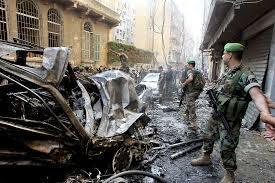
Three Lebanese soldiers were killed overnight by a group of gunmen near the Syrian border, the army said on Tuesday, in the deadliest such attack since the start of the Syrian uprising.
"Around 3:30am, an army position in the Wadi Hmayyed-Arsal was attacked by an armed group in a black Jeep," an army statement said. "The soldiers at the checkpoint faced off against the attackers, clashes ensued and three soldiers were killed," it added."Searches are continuing in the area for the armed men who escaped into the neighbouring field," the statement said.
A security source earlier told AFP the attack had taken place east of Arsal, a town in northeastern Lebanon where most residents support the Syrian uprising.
In a statement, President Michel Sleiman condemned the attack as "part of a series of terrorist, criminal acts that seek to instigate discord in the country." And Prime Minister Najib Mikati denounced the "aggression" and talked of the "difficult circumstances" through which Lebanon was passing.
Since the start of the rebellion against Syrian President Bashar al-Assad more than two years ago there have been outbreaks of deadly violence on the Lebanese border.
Two Lebanese soldiers were killed in Arsal in February when an army patrol was ambushed while chasing a wanted man. The incident sharply raised tension between residents and the army.
Lebanon is deeply divided over the war in Syria, and the majority Sunni Muslim village of Arsal is a particular flashpoint as refugees and fighters hostile to the Assad regime traverse the border.
Three mortar shells fired from Syria on Monday killed at least one woman near the eastern Lebanese town of Hermel, a bastion of the Hezbollah movement, a security official told AFP. On Tuesday, two more hit the area. The first lightly wounded two people on the outskirts of the town, and the second injured on person inside the town, the source said.
The powerful Lebanese Shiite movement Hezbollah is actively involved in the Syrian conflict, fighting alongside troops against rebels. It is currently engaged in fighting rebels in the central town of Qusayr and has lost dozens of its men.
Since the start of the Syria conflict in March 2011, a number of rockets and mortar shells have struck Lebanese territory. On two occasions, the rebel Free Syrian Army claimed responsibility for the attacks in response to Hezbollah's involvement.Hezbollah leader Hassan Nasrallah has promised "victory" to his supporters in the battle taking place, notably in Qusayr. On Monday, rockets fell for the first time in the southern suburbs of Beirut, a stronghold of the Shiite movement.
The Syrian crisis is also spreading in northern Lebanon, where fighting between Sunnis and Alawites, the sect to which Assad belongs, killed 31 people last week.
The Syrian regime is led by the Alawite minority community, an offshoot of Shiite Islam, while the majority of the country's population are Sunnis. (Source: http://news.ph.msn.com/top-stories/gu...)
Published 05/28/13
 And now Russia is planning to arm the Syrian regime. Lebanon will be caught between them and Israel as the Israelis respond to Russian intervention. And like a stone thrown in a pond, the circles will widen and expand to involve who-knows-who.
And now Russia is planning to arm the Syrian regime. Lebanon will be caught between them and Israel as the Israelis respond to Russian intervention. And like a stone thrown in a pond, the circles will widen and expand to involve who-knows-who.
I hope they think twice about doing this. I knew it was a bad sign when Kerry was kept waiting for three hours and then when Putin finally met with him he kept fiddling his pen.
Books mentioned in this topic
Everyday Jihad: The Rise of Militant Islam among Palestinians in Lebanon (other topics)A House of Many Mansions: The History of Lebanon Reconsidered (other topics)
A Mirror Of The Arab World: Lebanon in Conflict (other topics)
Pity the Nation: The Abduction of Lebanon (other topics)
A History of Modern Lebanon (other topics)
More...
Authors mentioned in this topic
Bernard Rougier (other topics)Kamal Salibi (other topics)
Sandra Mackey (other topics)
Robert Fisk (other topics)
Fawwaz Traboulsi (other topics)
More...





http://usatoday30.usatoday.com/life/b...